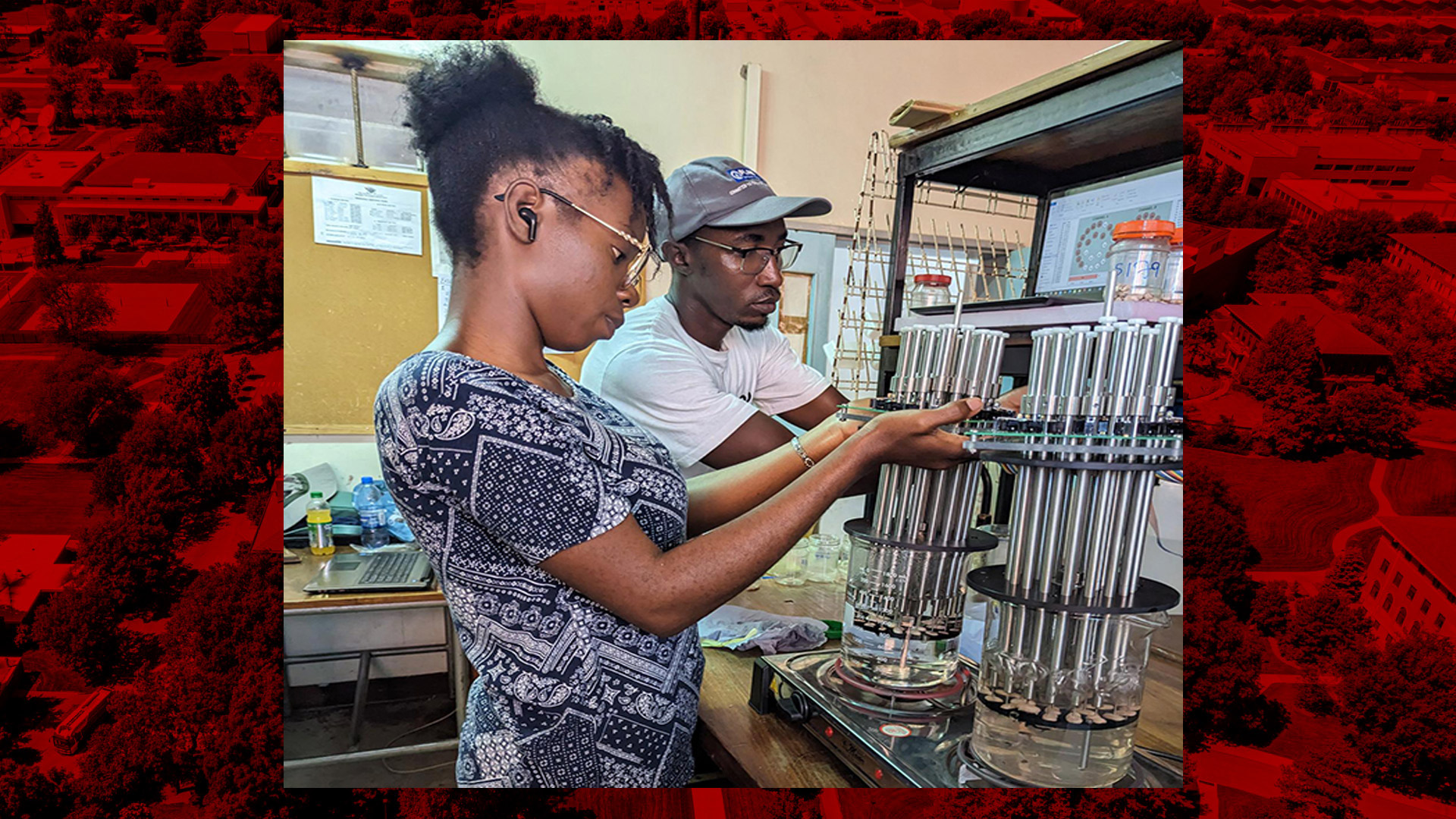
Chabella Guzman, Communications Spec I Carlos Urrea, University of Nebraska–Lincoln dry bean breeding specialist
In April, Carlos Urrea, a University of Nebraska–Lincoln dry bean breeding specialist, traveled to Lusaka, Zambia, to help install Mattson Cookers and visit field experiments. The “Genetic Improvement of Dry Beans for Bruchid Resistance for Southern Africa” project is funded by the Feed the Future Innovation Lab for Legume Systems Research.
The four-year bean breeding project involves the bean varieties, Calinas, Kablanguchs, and light red Kidneys and will wrap up this month in June.
The beans have been bred to be resistant to the bruchid beetle, a storage pest of dry beans, by Kelvin Kamfwa, Senior Lecturer and breeder at the University of Zambia.
Kelvin Kamfwa, senior lecturer and breeder at the University of Zambia (UNZA), and Swivia Hamabwe, staff development fellow at UNZA, in a bean field.
Urrea provided technical assistance to install two Mattson Cookers and ran six dry bean samples soaked the previous day.
The students from left clockwise, Bethel Njobvu, Mukuni Nkandela, Rabecca Thole, Swivia Hamabwe, and Kuwabo Kuwabo, were careful in installing the cookers. Several UNZA faculty from the Plant Science and Food Science Departments also visited the lab to learn about the Mattson Cookers. Part of the project is to see if the resistance trait affects the dry beans' cooking length and yield, desirable traits to the consumer and farmer.
On April 20, Urrea visited Golden Valley Agricultural Research Trust, Chisamba Farm, with Kamfwa and Hamabwe. The trio toured the dry bean field trials comprised of the Diversity panels, recombinant inbred lines population, and the advanced yield trials. In the advanced yield trial for navies, the navy line N17505 showed drought/heat tolerance and performed well across all sites in the field. We also visited the soybean breeding program nursery. Overall, soybeans showed more resilience than dry beans to drought stress.
The trio visited the AgriTech Expo in the afternoon at the Golden Valley Agricultural Research Trust, Chisamba Farm. Several agricultural-related companies exhibited a wide range of their products, including chemicals, varieties, animal breeds, machinery, and technical skills. Most of the varieties were exhibited through the demo plots. We interacted with the marketing personnel for several companies, including Good Nature Agro (GNA), a collaborating company on the project.
On April 21, we ran eight additional cooking bean samples with the team that was present during the installation. UNZA faculty Kuwabo Kuwabo, Tobias Alubi, and Swivia Hamabwe visited the lab to learn about Mattson Cookers. Some experiences and tips while working with Mattson Cookers were shared. For example, saving the cooking time data in hard and soft copy was emphasized, and the use of gloves when handling hot water.
In the afternoon, a guided tour was made by Thole and Hamabwe to the greenhouse where the cross-breeding is done and the early-generation populations are grown. Urrea visited the seed storage facilities where seed processing and storage are done. A team of interns was found processing recently harvested seed for weevil-resistant lines developed by the project.
After working with Kamfwa’s team and making new friends, Urrea headed back to the States on April 25, to continue research at the Panhandle Research Extension and Education Center in Scottsbluff.
Urrea thanks Dr. Kelvin and his dedicated research team for their hospitality and willingness to learn. The University of Zambia - Kelvin Kamfwa Senior Lecturer, Breeder, Swivia Hamabwe staff development fellow, Kuwabo Kuwabo MSc student, Pride Cheelo PhD student, Kufekisa Wakung’uma MSc student, Mwense Pule Brian MSc student, Rabecca Thole MSc student, Mukuni Nkandela MSc student, Joseph Botha MSc student, Bethel Njobvu lab technician, Lomanzi Chikani lab intern, Lushomo Mukakanga lab intern, Linetty Samakayi lab intern, Dorcas Nalwamba lab intern, Leah Nawale lab intern, and Delphine Shimbwambwa lab intern GNA - Matale Mwiya breeding technician and Jeanno Muteta retail sales manager
He also thanks the financial support through USAID Feed the Future Innovation Lab for Legume Systems Research Project led by Dr. Juan Osorno, North Dakota State University.
More details at: https://go.unl.edu/v06s